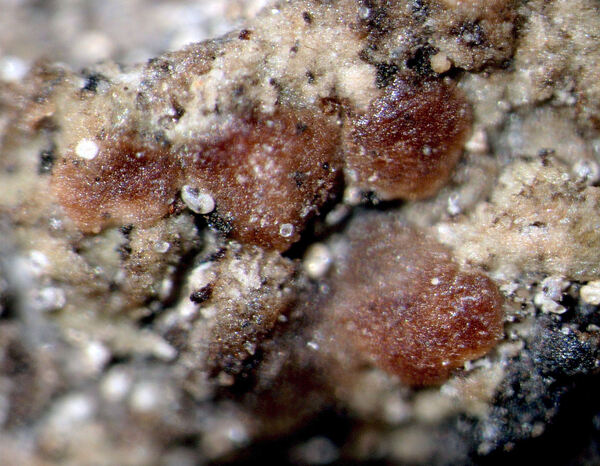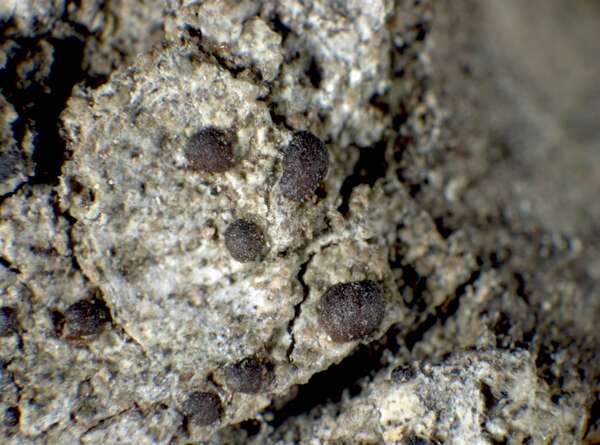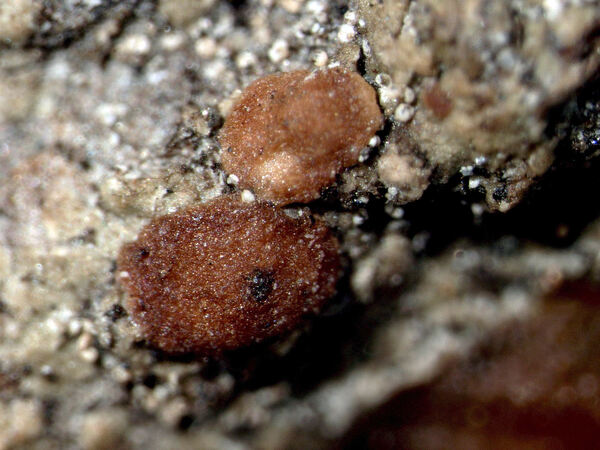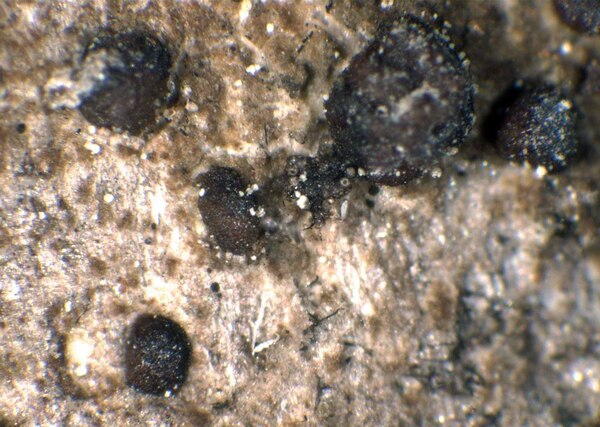Japewia tornoënsis (Nyl.) Tønsberg
Lichenologist, 22: 206, 1990. Basionym: Lecidea tornoënsis Nyl. - Herbar. Mus. Fenn.: 110, 1859.
Synonyms: Biatora tornoënsis (Nyl.) Th. Fr.; Lecidea breadalbanensis Stirt.; Lecidea frigidella Nyl.; Mycoblastus tornoënsis (Nyl.) R.A. Anderson
Description: Thallus crustose, brown-green to dark brown, thin, continuous to rarely rimose, often evanescent, smooth, forming up to 5 cm wide patches. Apothecia biatorine, sessile, 0.4-0.8(-1) mm across, with a dark reddish brown, epruinose, usually strongly convex, often tuberculate disc, and a mostly indistinct proper margin. Proper exciple thin, colourless to brown, of radially arranged hyphae; epithecium thin, brownish, without crystals; hymenium colourless or brown-streaked in upper part, 50-90 µm high, K-, I-; paraphyses coherent, branched and anastomosing, 1-1.5 µm thick at mid-level, the apical cells up to 3.5(-4) µm wide, with a distinct brown cap, the pigment deposited outside the cell wall; hypothecium colourless or patchily brown, 60-185 µm high. Asci (6-)8-spored, broadly clavate, with a well-developed amyloid tholus, with or without a distinct ocular chamber, a non-amyloid wall and an amyloid outer cap. Ascospores 1-celled, hyaline, broadly ellipsoid to subglobose, (15-)17-22(-24) x (8-)10-15 µm, the wall layered, (1-)1.5-2.5(-3) µm thick. Photobiont chlorococcoid. Spot tests: thallus K-, C-, KC-, P-, UV-. Chemistry: without lichen substances.
Growth form: Crustose
Photobiont: green algae other than Trentepohlia
Reproductive strategy: mainly sexual
Commonnes-rarity: (info)
Alpine belt: extremely rare
Subalpine belt: rather common
Montane belt: rare
Dry submediterranean belt: absent
Humid submediterranean belt: absent
Padanian area: absent
pH of the substrata:
1 2 3 4 5
Solar irradiation:
1 2 3 4 5
Aridity:
1 2 3 4 5
Eutrophication:
1 2 3 4 5
Poleotolerance:
0 1 2 3
Altitudinal distribution:
1 2 3 4 5 6
Rarity
absent
extremely rare
very rare
rare
rather rare
rather common
common
very common
extremely common
Loading data...
Occurrence data
Predictive map
Growth form: Crustose
Photobiont: green algae other than Trentepohlia
Reproductive strategy: mainly sexual
Commonnes-rarity: (info)
Alpine belt: extremely rare
Subalpine belt: rather common
Montane belt: rare
Dry submediterranean belt: absent
Humid submediterranean belt: absent
Padanian area: absent
pH of the substrata:
| 1 | 2 | 3 | 4 | 5 |
Solar irradiation:
| 1 | 2 | 3 | 4 | 5 |
Aridity:
| 1 | 2 | 3 | 4 | 5 |
Eutrophication:
| 1 | 2 | 3 | 4 | 5 |
Poleotolerance:
| 0 | 1 | 2 | 3 |
Altitudinal distribution:
| 1 | 2 | 3 | 4 | 5 | 6 |
Rarity
absent
extremely rare
very rare
rare
rather rare
rather common
common
very common
extremely common
Loading data...
Occurrence data
Predictive map










